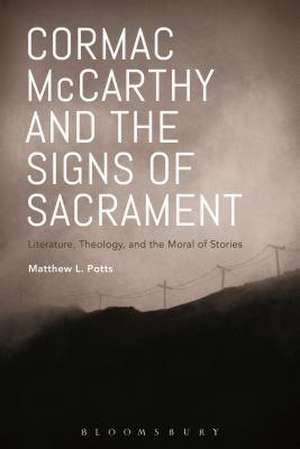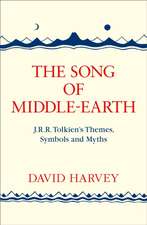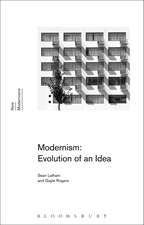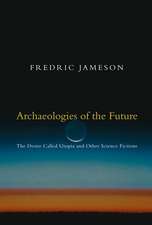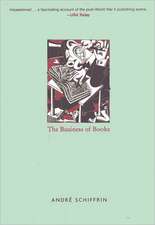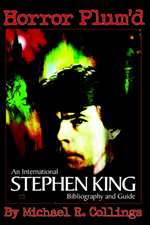Cormac McCarthy and the Signs of Sacrament: Literature, Theology, and the Moral of Stories
Autor Dr. Matthew L. Pottsen Limba Engleză Hardback – 23 sep 2015
| Toate formatele și edițiile | Preț | Express |
|---|---|---|
| Paperback (1) | 256.59 lei 6-8 săpt. | |
| Bloomsbury Publishing – 22 mar 2017 | 256.59 lei 6-8 săpt. | |
| Hardback (1) | 773.06 lei 6-8 săpt. | |
| Bloomsbury Publishing – 23 sep 2015 | 773.06 lei 6-8 săpt. |
Preț: 773.06 lei
Preț vechi: 1112.49 lei
-31% Nou
Puncte Express: 1160
Preț estimativ în valută:
147.93€ • 154.96$ • 122.60£
147.93€ • 154.96$ • 122.60£
Carte tipărită la comandă
Livrare economică 09-23 aprilie
Preluare comenzi: 021 569.72.76
Specificații
ISBN-13: 9781501306556
ISBN-10: 1501306553
Pagini: 232
Dimensiuni: 152 x 229 x 14 mm
Greutate: 0.48 kg
Editura: Bloomsbury Publishing
Colecția Bloomsbury Academic
Locul publicării:New York, United States
ISBN-10: 1501306553
Pagini: 232
Dimensiuni: 152 x 229 x 14 mm
Greutate: 0.48 kg
Editura: Bloomsbury Publishing
Colecția Bloomsbury Academic
Locul publicării:New York, United States
Caracteristici
Explains and expands recent trends in Christian sacramental theology though engagement with postmodern theory
Notă biografică
Matthew L. Potts is Assistant Professor of Ministry Studies at the Divinity School of Harvard University, USA. His teaching and research focuses on Christianity and contemporary American literature.
Cuprins
AcknowledgementsIntroduction1. Knowledge2. Fate3. Action4. Story5. SacramentEpilogueNotesBibliographyIndex
Recenzii
It might seem, at first glance, willfully counterintuitive to scour McCarthy's resolutely horrific fiction for signs of grace. Yet this is precisely what makes McCarthy such a rewarding case study for a literature of sacrament . This book warrants careful reading and critical attention. Given the various ways Potts is alive to the subtleties of Christian theology-especially to the semiotics of sacrament-and given how dexterously he transposes that thought into the space of literature, this book will surely be of value in ongoing debates about the postsecularism of American letters. Moreover, the book's value within the more specialist discourse of McCarthy criticism will be doubly pronounced. While Potts delivers new and significantly revised readings of well-known moments within McCarthy's canon, the polemical edge given to some of his claims is certainly justified. Inattention to sacrament is 'regrettable,' we are told, because it 'impoverishes interpretation' (1). The truth of this claim is born out in its antipode: a newfound knowledge of the sacrament, made perfectly legible here, will certainly enrich our reading.
Cormac McCarthy and the Signs of Sacrament is and will for a long time remain the best treatment we have of McCarthy as proto-postmodern theologian. Matthew Potts' readings recuperate the category of 'story' for postmodernity.
Matthew Potts's book is sometimes as dark and haunting as McCarthy's novels themselves. It is a complex meditation through close readings of the books and their characters, contained within careful readings of Nietzsche, Arendt, Adorno, Auerbach, Judith Butler and others. Against the background of the failure of religious institutions in which deep and sacramental elements rise to the surface of life known often as mere violence, Potts offers a reading of these fictions which avow the profound vulnerability at the heart of God and make space for a sacramental understanding of the world in which nihilism and decay are never far away.
Cormac McCarthy's work is fraught with Christian imagery, but often Christianity becomes a dark, moral undertow in the works, seemingly designed to highlight a nihilistic, violent view of the world. Churches most often lie in ruin, talismans scattered. Prayers go unanswered. The morally 'good' often brutally die. Though Potts (ministry studies, Harvard Divinity School) acknowledges the validity of Gnostic, nihilistic, and existential readings of the novels, he systematically and deliberately guides readers through a theological approach, examining McCarthy's frequent invocations of sacrament (the Eucharist in particular) in a nonreductive context and using postmodern theory as critical ballast. In doing so, Potts provides a revelatory bright stroke in the rapidly expanding field of McCarthy scholarship. Of particular interest is Potts's reading of The Road, as he casts, for example, new light on the baptismal images in the text. In places, Potts's mode could be more integrative: he tends to use subheadings within chapters to 'flip' between direct textual analysis and contextual development (rather than intertwining these modes). For example, a discussion of the father and son in The Road stops dead in its tracks to develop subsequent sections on 'divine dispossession' and 'narration and incarnation.' Overall, however, Potts's immersion in McCarthy yields fresh insights and previously unexplored theological angles. Summing Up: Highly recommended. Lower-division undergraduates through faculty.
McCarthy readers will find that Potts' focused reading of the philosophical and Christian allusions in McCarthy helps him elucidate particular scenes and then weave his insights into a careful, broader argument about McCarthy's worldview. This approach provides a clearer understanding of McCarthy's persistent scenes of human kindness amidst violence and inhumanity.
Potts offers a valuable contribution to McCarthy studies as well as scholarship in Christian theology, noting that scholarship on the novels, for all its attention to McCarthy's treatment of religious themes, pays too little attention to this trope ... One of the most notable achievements of this text is its engagement with an impressive roster of postmodern theorists, including Theodor Adorno, Hannah Arendt, Adriana Cavaerero, Karl Barth, and Judith Butler, while also conducting careful, insightful readings of McCarthy and his critics ... [T]he question of how to locate value and meaning in these novels has remained one of the foremost concerns for McCarthy scholarship. Without retreating into a reductive, totalizing account, Potts manages to bring a fresh perspective on these enduring questions.
This meticulously thought-out and presented discussion of the sacramentality within the works of Cormac McCarthy is both engaging and convincing, leaving me to wonder how McCarthy scholars will respond to the insights and analysis Potts has taken such great care to lay out. Regardless of whether those scholars agree or disagree with Potts, they certainly must engage with him, as his reading of McCarthy suggests shortcoming in much of what has already been written.
To those interested in the dynamic relationship between theology and literature, the work of novelist Cormac McCarthy has long been begging for a sustained critical treatment. With the recent release of Mathew Potts's Cormac McCarthy and the Signs of Sacrament, we are treated to such a book-a study that is to be particularly commended for mining the theological content so prevalent in McCarthy's work . Pott's beautifully written text makes choice contributions not only to sacramental aesthetics, but to the fields of ethics and narrative theory as well.
Matthew L. Potts attempts in Cormac McCarthy and the Signs of Sacrament to treat a surprisingly understudied aspect of McCarthy's fiction, namely, his use of sacramental imagery in his novels. . Potts deftly balances exposition of McCarthy's novels and analysis of those narratives, and he brings a sophisticated set of hermeneutical tools to McCarthy's texts. The result is an engaging study from which both the newcomer to McCarthy and the reader familiar with his fiction can learn a great deal.
Cormac McCarthy and the Signs of Sacrament is and will for a long time remain the best treatment we have of McCarthy as proto-postmodern theologian. Matthew Potts' readings recuperate the category of 'story' for postmodernity.
Matthew Potts's book is sometimes as dark and haunting as McCarthy's novels themselves. It is a complex meditation through close readings of the books and their characters, contained within careful readings of Nietzsche, Arendt, Adorno, Auerbach, Judith Butler and others. Against the background of the failure of religious institutions in which deep and sacramental elements rise to the surface of life known often as mere violence, Potts offers a reading of these fictions which avow the profound vulnerability at the heart of God and make space for a sacramental understanding of the world in which nihilism and decay are never far away.
Cormac McCarthy's work is fraught with Christian imagery, but often Christianity becomes a dark, moral undertow in the works, seemingly designed to highlight a nihilistic, violent view of the world. Churches most often lie in ruin, talismans scattered. Prayers go unanswered. The morally 'good' often brutally die. Though Potts (ministry studies, Harvard Divinity School) acknowledges the validity of Gnostic, nihilistic, and existential readings of the novels, he systematically and deliberately guides readers through a theological approach, examining McCarthy's frequent invocations of sacrament (the Eucharist in particular) in a nonreductive context and using postmodern theory as critical ballast. In doing so, Potts provides a revelatory bright stroke in the rapidly expanding field of McCarthy scholarship. Of particular interest is Potts's reading of The Road, as he casts, for example, new light on the baptismal images in the text. In places, Potts's mode could be more integrative: he tends to use subheadings within chapters to 'flip' between direct textual analysis and contextual development (rather than intertwining these modes). For example, a discussion of the father and son in The Road stops dead in its tracks to develop subsequent sections on 'divine dispossession' and 'narration and incarnation.' Overall, however, Potts's immersion in McCarthy yields fresh insights and previously unexplored theological angles. Summing Up: Highly recommended. Lower-division undergraduates through faculty.
McCarthy readers will find that Potts' focused reading of the philosophical and Christian allusions in McCarthy helps him elucidate particular scenes and then weave his insights into a careful, broader argument about McCarthy's worldview. This approach provides a clearer understanding of McCarthy's persistent scenes of human kindness amidst violence and inhumanity.
Potts offers a valuable contribution to McCarthy studies as well as scholarship in Christian theology, noting that scholarship on the novels, for all its attention to McCarthy's treatment of religious themes, pays too little attention to this trope ... One of the most notable achievements of this text is its engagement with an impressive roster of postmodern theorists, including Theodor Adorno, Hannah Arendt, Adriana Cavaerero, Karl Barth, and Judith Butler, while also conducting careful, insightful readings of McCarthy and his critics ... [T]he question of how to locate value and meaning in these novels has remained one of the foremost concerns for McCarthy scholarship. Without retreating into a reductive, totalizing account, Potts manages to bring a fresh perspective on these enduring questions.
This meticulously thought-out and presented discussion of the sacramentality within the works of Cormac McCarthy is both engaging and convincing, leaving me to wonder how McCarthy scholars will respond to the insights and analysis Potts has taken such great care to lay out. Regardless of whether those scholars agree or disagree with Potts, they certainly must engage with him, as his reading of McCarthy suggests shortcoming in much of what has already been written.
To those interested in the dynamic relationship between theology and literature, the work of novelist Cormac McCarthy has long been begging for a sustained critical treatment. With the recent release of Mathew Potts's Cormac McCarthy and the Signs of Sacrament, we are treated to such a book-a study that is to be particularly commended for mining the theological content so prevalent in McCarthy's work . Pott's beautifully written text makes choice contributions not only to sacramental aesthetics, but to the fields of ethics and narrative theory as well.
Matthew L. Potts attempts in Cormac McCarthy and the Signs of Sacrament to treat a surprisingly understudied aspect of McCarthy's fiction, namely, his use of sacramental imagery in his novels. . Potts deftly balances exposition of McCarthy's novels and analysis of those narratives, and he brings a sophisticated set of hermeneutical tools to McCarthy's texts. The result is an engaging study from which both the newcomer to McCarthy and the reader familiar with his fiction can learn a great deal.
